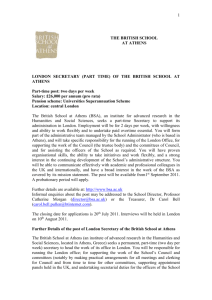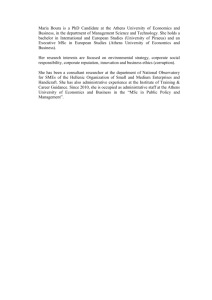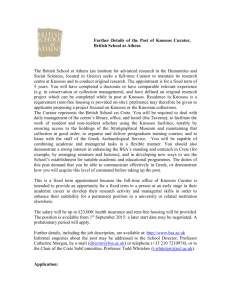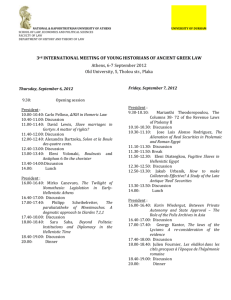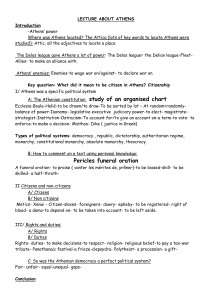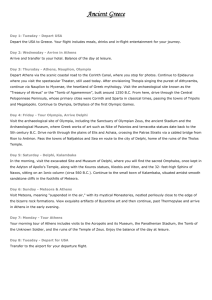School Teacher Fellowship advert
advertisement
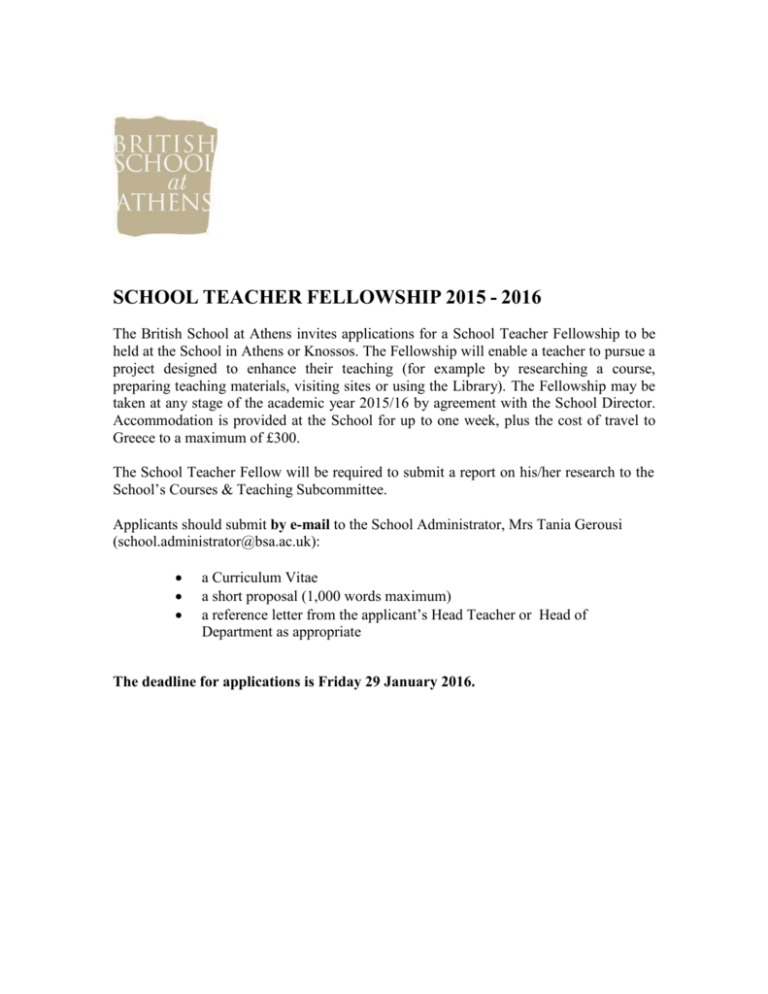
SCHOOL TEACHER FELLOWSHIP 2015 - 2016 The British School at Athens invites applications for a School Teacher Fellowship to be held at the School in Athens or Knossos. The Fellowship will enable a teacher to pursue a project designed to enhance their teaching (for example by researching a course, preparing teaching materials, visiting sites or using the Library). The Fellowship may be taken at any stage of the academic year 2015/16 by agreement with the School Director. Accommodation is provided at the School for up to one week, plus the cost of travel to Greece to a maximum of £300. The School Teacher Fellow will be required to submit a report on his/her research to the School’s Courses & Teaching Subcommittee. Applicants should submit by e-mail to the School Administrator, Mrs Tania Gerousi (school.administrator@bsa.ac.uk): a Curriculum Vitae a short proposal (1,000 words maximum) a reference letter from the applicant’s Head Teacher or Head of Department as appropriate The deadline for applications is Friday 29 January 2016. THE BRITISH SCHOOL AT ATHENS The British School at Athens is an educational charity founded in 1886. It now forms part of the British Academy's network of Sponsored Institutes and Societies (BASIS) which sustains and supports British research overseas. The School exists to promote research of international excellence in all disciplines pertaining to Greek lands, from fine art to archaeometry, and in all periods to modern times. The School does this through: a programme of research undertaken both alone and in collaboration with UKbased and other overseas institutions; an academic programme of seminars, lectures, and conferences; our internationally renowned library; the provision of services for members, including applications for study and fieldwork permits; advice on the development of research programmes; access to accommodation and facilities in Athens and Knossos; provision of online services; promoting the use of our archival, laboratory, and museum collections by the scholarly community worldwide; the provision of funding (including studentships and visiting fellowships) for research in Greece, and to enable Greek researchers to visit the UK; the provision of internships and training courses for undergraduates, postgraduates, and schoolteachers. Details of current School projects and the Strategic Plan for Research 2015-2020 may be found at www.bsa.ac.uk. Size and Scope The School, which was founded in 1886, is an institute for advanced research and a registered UK charity (no. 208673). It maintains a hostel offering affordable accommodation to members, a world-class library, archive, laboratory for archaeological science, and offices in Athens; a smaller hostel, library and museum for study purposes in Knossos; and an office in London. It has five full-time academic staff, three research fellows, three full-time and two part-time administrative/secretarial staff, three full-time library/archival staff; and five full-time and two part-time domestic staff. The academic staff, the research fellows, the IT Officer, and the Archivist are all actively engaged in research, and all staff are encouraged to undertake professional development. In addition, the School is supported by research-active non-executive staff in the UK, notably the Chairman of Council (Professor Malcolm Schofield) and the honorary treasurer (Dr Carol Bell). It offers two full studentships and several smaller bursaries for scholars every year, and in various ways aids the research of around 2,000 scholars worldwide. Its average annual turnover is approximately 1.3m pounds. Staffing The School has the following research staff, details of whose research interests and publications are available at www.bsa.ac.uk: Full-time academic staff: Professor John Bennet, Director; Dr Chryssanthi Papadopoulou, Assistant Director; Dr Evangelia Kiriatzi, Director of the Fitch Laboratory; Dr Caroline Thurston, Knossos Curator; and Dr Noémi Muller, Scientific Research Officer. Full-time research fellows: Dr John Gait, Williams Fellow in ceramic petrology; Dr. Eirini Avramopoulou, Leventis Fellow; and Dr Ozge Dilaver Kalkan, Balkan Futures Fellow (co-appointment with the British Institute at Ankara). Research-active staff with other primary responsibilities: Dr Jéan-Sebastien Gros, IT officer; and Ms Amalia Kakissis, Archivist. Infrastructure and Facilities The School’s principal research infrastructure consists of its Library, its Museum, its Fitch Laboratory and its facilities at Knossos. The Library in Athens contains over 70,000 monographs, 1,000 periodical titles and 2,000 maps, and has space for 50 readers. It is staffed by two full-time librarians (Mrs Penny Wilson-Zarganis and Ms Sandra Pepelasis) with the help of a student library assistant. Members have 24-hour access. While providing a broad research-level coverage of Greek history and archaeology of all periods, it specialises in the fields of Aegean prehistory, ancient art and epigraphy, and Byzantine and modern Greek studies; it also houses historical collections (such as George Finlay’s library) and a fine collection of Greek and Balkan journals. The library is particularly rich in the area of Byzantine and medieval material culture, extending into the principal contact cultures which shaped the Byzantine world: in this area it complements the primarily literary and historical holdings of the Gennadius Library of the American School of Classical Studies. The School’s collections are enhanced by those of the other foreign schools and institutes in Athens with whom we have reciprocal arrangements giving access to a unique collection of more than 450,000 titles on Hellenic Studies. We have particularly strong links with the neighbouring Blegen and Gennadius libraries of the American School, with whom we now share a common electronic library catalogue (AMBROSIA, American British Online Search in Athens) available via www.bsa.ac.uk. The Archive contains records of the School’s field projects going back to 1886; material from the Byzantine Research Fund, ca. 1895-1936 (ca. 6,500 unique plans, drawings and photographs of Byzantine architecture - some of buildings now destroyed); the George Finlay papers, including journals from the Greek War of Independence; travel notebooks (Gell, Stuart); ethnographic records and a large collection of glass negatives. The archivist is responsible for access and conservation of the collection, and for projects to conserve, electronically catalogue and digitise images from selected collections. The Marc and Ismene Fitch Laboratory for Science-based Archaeology, founded in 1974, was the first of its kind in Greece. It specialises principally in the analysis of inorganic materials (mainly pottery, as well as metals, wall paintings, and glass) and in geophysical prospection, specialisms which are complementary to the work of the neighbouring Wiener Laboratory of the American School of Classical Studies in Athens. It maintains facilities for petrological analysis of pottery (facilities for thin section preparation and 2 research polarising microscopes coupled with a digital photography system) and a WD-XRF instrument for chemical analysis. It houses comparative collections of over 10,000 archaeological samples and over 3,000 geological samples. For the needs of geophysical prospection it has a magnetometer and a resistivity meter. It also maintains a reference collection of animal bones and seeds with ample space for strewing archaeological material, and is able to offer annually a bursary on bioarchaeology and a senior visiting fellowship. It is staffed by its director, scientific research officer, part-time research and administrative assistant, the Williams Fellow, and project-related research assistants. The Fitch plays a full part in the School’s postgraduate teaching activities, currently staging an annual short course on ceramic petrology. At Knossos, the BSA maintains a hostel, a small library (specialising in matters Cretan and prehistoric) and the Stratigraphical Museum (a storeroom and study centre) with a curator and a small part-time staff. The Stratigraphical Museum houses finds from excavation in Knossos and elsewhere in Crete from the time of Arthur Evans (1905) to the present, representing a vast scholarly resource of international significance. Proximity to the School’s hostel allows scholars to study material intensively year round. The School’s administrative and academic staff (principally the Administrator) makes use of the School’s wide-ranging connections to help individual scholars with permit applications. The research infrastructure is underpinned by the IT network, maintained by the IT Officer. His role includes both the integration of IT into research strategies and outcomes, and the development of web-based digital resources for researchers and the wider community. Dissemination and Publication of Research The BSA publishes the results of its own research in all fields. The School’s Annual (running since 1895 and now published by CUP) is devoted to publishing the work of the School, which comprises articles written by its officers and other members, the work of the Fitch, and preliminary reports on fieldwork. The School also compiles an annual account of archaeological fieldwork in Greece, Archaeology in Greece, which is published online (in collaboration with the École française d’Athènes) and in a print digest in collaboration with the Society for the Promotion of Hellenic Studies as part of Archaeological Reports. Final reports on major excavation or survey projects usually appear in the School’s Supplementary Volumes or Studies series, also used for publishing the School’s conferences. The School recognises its role in conserving and facilitating access to the archives (in all media) produced by major archaeological and nonarchaeological projects. To this end we are active in cataloguing and digitizing our Archive, and in making it available via the School website. Further information about the School can be found at www.bsa.ac.uk
